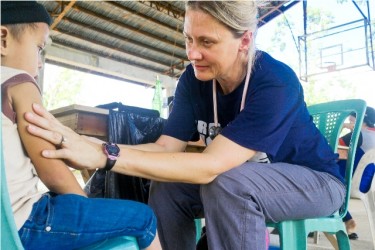By Michael Ferraresi
GCU News Bureau
Typhoon Yolanda presented a perfect opportunity for Carma Erickson-Hurt to put her nursing servant leadership ideals to work.
After the deadly tropical storm leveled parts of the Philippines in November, the U.S. Navy veteran and Grand Canyon University online faculty member trained teams of nurses in the disaster-ravaged Asian nation to better understand how to tend to dying patients.
Earlier this month, Erickson-Hurt was awarded the silver medal as the 2013 Volunteer of the Year by international nonprofit Project HOPE for teaching teams of nurses to manage palliative care — the compassionate, hospice-like attention designed to improve the quality of a patient’s final days of life.
Erickson-Hurt worked in the remote Tapaz region of the southern Philippines, where she thought nurses at a regional hospital could benefit from training. She and other volunteer nurses also visited up to several hundred patients a day, assisting those suffering from terminal illnesses whose conditions were exacerbated by the lack of resources in the wake of the typhoon.
“Some of those people had never seen a health care professional in their lives,” said Erickson-Hurt, who teaches GCU online undergraduate nursing courses from her homes in Oregon and Idaho.
“It was very, very remote,” Erickson-Hurt said of the Tapaz region. “(The Filipino nurses) were like sponges. They wanted to learn. … They were very appreciative.”
Erickson-Hurt has volunteered with Virginia-based Project HOPE, which stands for Health Opportunities for People Everywhere, since 2010. Her international outreach work includes a Project HOPE aid mission to Haiti, where health care volunteers helped several hundred patients in the wake of the disaster. She first worked with the nonprofit while serving as a Navy nurse in Indonesia in 2005.
Typhoon Haiyan/Yolanda killed nearly 6,300 people and displaced more than 4 million Filipinos, according to the U.S. Agency for International Development.
Erickson-Hurt recalled seeing a woman with tumors protruding from her body and realizing that nurses in the Tapaz region needed to know the essentials of hospice training in order to give patients like her greater care as they neared death.
“When you think there’s nothing more you can do, there’s a lot more you can do,” Erickson-Hurt said, adding that spirituality, psychology and social support can help provide relief to suffering patients.
She said she developed her passion for nursing, and teaching, during 20 years of service in the Navy. At GCU, she has shared her experiences with nursing students through courses related to pathophysiology, professional dynamics and health assessment.
“I feel like I can exponentially pass on that knowledge, plus I just love it,” she said. “It keeps me active because they challenge me, too.”
Maria Quimba, assistant dean of GCU’s College of Nursing and Healthcare Professions, described Erickson-Hurt as dedicated to teaching — even as her Navy duties called. Quimba remembered a time when Erickson-Hurt notified the college she would be at an undisclosed location in the middle of the ocean and unreachable and also called each student personally to make sure they understood the potential delay in their online classroom.
“I’m thinking, ‘You’re trying to save lives here, you’re in charge of an entire team of individuals, and you’re still thinking about your students,’” Quimba said. “Clearly she goes above and beyond and really cares. That left a huge impression on me.
“I think she has a tremendous sense of duty. She really understands that value of compassion.”
Contact Michael Ferraresi at 602.639-7030 or [email protected].




































































